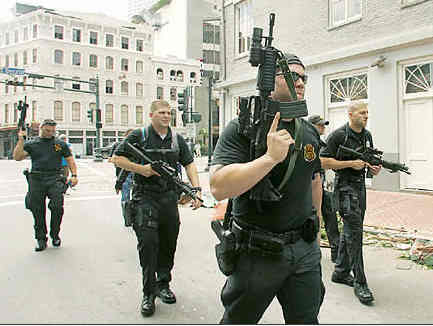Police raided a Pakistani security firm that helps protect the U.S. Embassy on Saturday, seizing 70 allegedly unlicensed weapons and arresting two people. The incident follows a series of scandals surrounding American use of private contractors in Iraq and Afghanistan.

The U.S. says there is no truth in the reports, but they have resonated with the many Pakistanis familiar with allegations that Blackwater employees were involved in unprovoked killings of Iraqi civilians.

Reporters were shown the weapons — 61 assault rifles and nine pistols — that were seized by dozens of police from the sites in pre-dawn raids in the capital, Islamabad.
U.S. Embassy spokesman Rick Snelsire said the U.S. contract with Inter-Risk to provide security at the embassy and consulates took effect this year. It is believed to be the first U.S. contract for the firm, Snelsire said. He did not know how long the contract was for or what it was worth.
"Our understanding is they obtained licenses with whatever they brought into the country to meet the contractual needs," he said. "We told the government that we had a contract with Inter-Risk."
A man who answered the phone number listed for the company and identified himself as Riaz Hussain said a raid had occurred, but gave no more information.
According to Inter-Risk's Web site, it was first formed in 1988 and offers wireless home alarm systems as well as security guards and other services.
Though the U.S. Embassy in Islamabad does have American security staff, much of the work is done by local workers. At checkpoints and gates leading to the embassy compound, for instance, Pakistani security guards inspect vehicles and log in visitors.
Scandals involving private contractors have dogged the U.S. in the Middle East and South Asia.
In Washington on Friday, the Commission on Wartime Contracting heard testimony about another contractor — ArmorGroup North America — involving alleged illegal and immoral conduct by its guards at the U.S. Embassy in Afghanistan.
Earlier this year, the Iraqi government refused to grant Xe Services — the new name for what was once Blackwater — an operating license amid continued outrage over a 2007 lethal firefight involving some of its employees in Baghdad, although the State Department has temporarily extended a contract with a Xe subsidiary to protect U.S. diplomats in Iraq.
Many of the recent rumors in Pakistan have been prompted by U.S. plans to expand its embassy space and staff. Among the other unsubstantiated stories the U.S. denies: that 1,000 U.S. Marines will land in the capital, and that Americans will set up a Guantanamo-style prison.
The U.S. says it needs to add hundreds more staff to allow it to disburse billions of dollars in additional humanitarian and economic aid to Pakistan. The goal is to improve education and other areas, lessening the allure of extremism.
Pakistani reporters, anti-U.S. bloggers and others have repeatedly alleged that the U.S. is using Xe, and the issue continues to pop up in major newspapers despite U.S. Embassy denials. Xe Services officials could not immediately be reached for comment Saturday.
The U.S. has signed a contract worth up to $18.3 million with DynCorp International, another U.S.-based security firm, according to federal records online.

Pakistani political analyst Talat Masood said Inter-Risk's association with America "will increase the apprehensions that existed that the Americans are engaged in clandestine activities," and that the raid shows "the Pakistan government is asserting itself."
-=-=-=-=-=-=-=-=-=-=-=-=-=-=-=-=-=-=-=-=-=-=-=-=-=-=-=-=
More......
"Blackwater's sweetheart deals, both domestic and international, are representative of how business has been done under Bush. They are a troubling indicator of a trend toward less accountability and transparency and greater privatization of critical government functions."
Read: Existence of BlackWater in Pakistan http://pakistanic.com/featured/existense-of-black-water-in-pakistan-cia-blackwater-mercenary/








